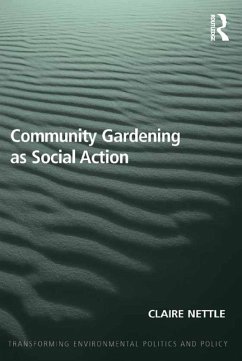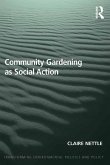Drawing on case studies and social movement theory Claire Nettle provides a new empirical and theoretical understanding of community gardening by applying a contextual framework that considers the activity as a way for people to engage in collective social action. Through this a richer, more complete understanding of community gardening as a form of social activity and of its potential contributions to activism, community, democracy and culture can be reached.
Dieser Download kann aus rechtlichen Gründen nur mit Rechnungsadresse in A, B, BG, CY, CZ, D, DK, EW, E, FIN, F, GR, HR, H, IRL, I, LT, L, LR, M, NL, PL, P, R, S, SLO, SK ausgeliefert werden.
'By showing that community gardening is often a deeply political act this book offers a profound challenge to dominant accounts of social movement activism. Nettle shows that community gardening is more than a cultural challenge and does not mean a retreat from real politics, rather it is a specific form of prefigurative activism intended to build communities anew. It is essential reading for all those with an interest in a deeper understanding of the relationship between activist strategies and everyday life practices.' Brian Doherty, Keele University, UK 'In this accessible read, Claire Nettle looks to provide a new understanding of community gardening by applying a contextual framework that considers the activity as a way for people to engage in collective social action. ... the book speaks to the broad themes of the collective use of public space, community engagement, and mutual support. In an era when more urban dwellers are turning their attention to these issues, post-recession, this work makes a timely and refreshing contribution.' LSE Review of Books 'A fascinating academic look at how, mainly but not exclusively in Australia, community gardening has in recent years grown (excuse the pun) and at the impact this has socially, beyond simply making public spaces look pretty. To my relief, the book firmly avoids slipping into familiar rose-tinted clichéd gush about the way that growing vegetables together changes lives and creates bonds, but instead stays detached and rational.' Historic Gardens Newsletter 'Nettle's account of Australian community gardening makes a convincing case for acknowledging broader repertoires of political activism, and for more inclusive social movement theory. ... This book will be of interest to those seeking a fresh perspective on the topic of community gardens; it is a welcome and critical contribution to literature on this subject that contains much of international relevance.' People, Place and Policy









